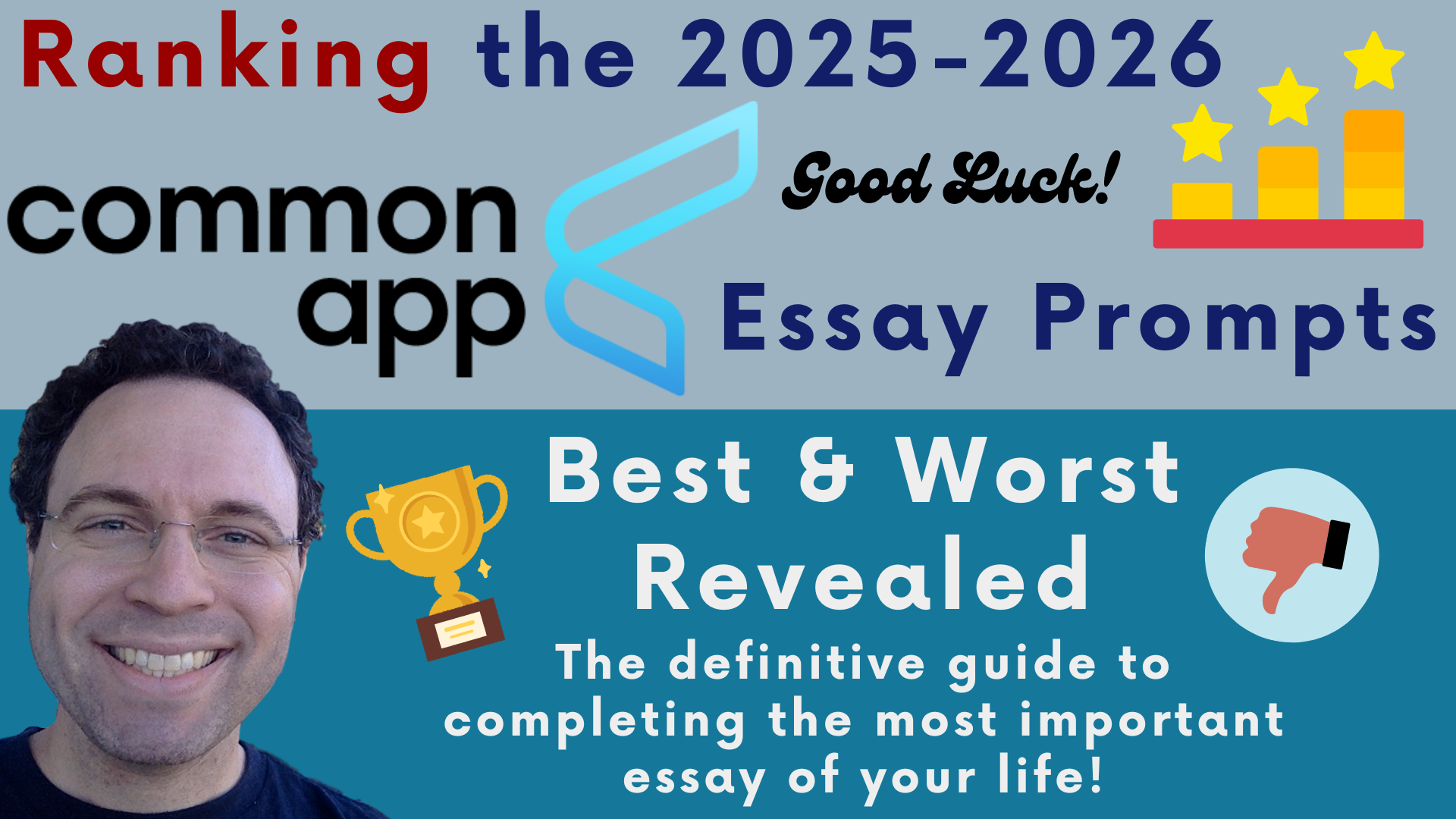
Did you know that some of the 2025-2026 Common App essay prompts will bring you down like quicksand while others give you the exact structure and framing that you need to show and tell a story that colleges will love?
Before watching my in depth video revealing the best and worst Common App essay prompts, it’s important that you know the seven prompts first-year college applicants have to choose from during the 2025-2026 admissions cycle in order to write one strong Common App essay of up to 650-words. The seven prompt options are:
- Some students have a background, identity, interest, or talent that is so meaningful they believe their application would be incomplete without it. If this sounds like you, then please share your story.
- The lessons we take from obstacles we encounter can be fundamental to later success. Recount a time when you faced a challenge, setback, or failure. How did it affect you, and what did you learn from the experience?
- Reflect on a time when you questioned or challenged a belief or idea. What prompted your thinking? What was the outcome?
- Reflect on something that someone has done for you that has made you happy or thankful in a surprising way. How has this gratitude affected or motivated you?
- Discuss an accomplishment, event, or realization that sparked a period of personal growth and a new understanding of yourself or others.
- Describe a topic, idea, or concept you find so engaging that it makes you lose all track of time. Why does it captivate you? What or who do you turn to when you want to learn more?
- Share an essay on any topic of your choice. It can be one you’ve already written, one that responds to a different prompt, or one of your own design.
Overall, to craft a Common App essay that maximizes your chances of impressing admissions officers, I always recommend starting by choosing a topic that reveals something new, authentic, and unique about you. The essay prompts are ultimately designed to let you show and tell a story only you can show and tell. Reflect deeply on moments that shaped your values, perspective, or growth, whether it’s a small, personal experience (like a conversation that changed your outlook) or a larger challenge (like overcoming a setback). Avoid generic themes like sports victories or mission trips unless you can frame them in a way that’s deeply personal and unexpected. Admissions officers read thousands of essays, so specificity—vivid details, emotions, and insights—sets you apart. For example, instead of writing about “leadership,” describe the moment you hesitated before speaking up in a group and what pushing past that fear taught you.
Once you’ve picked a story, focus on showing rather than telling for at least half the essay. Use sensory details and dialogue to pull readers into the scene, letting your personality shine through your voice. If you’re writing about, say, a family tradition, don’t just say it was meaningful; describe the smell of the food, the sound of laughter, or the awkward silence when someone brought up a tough topic. This paints a picture that feels alive and lets your character emerge naturally. Avoid overloading the essay with objective achievements (especially if you shared details about them elsewhere in your app); your activities list already covers those. Instead, use the essay to reveal what drives you, what you wrestle with, or how you’ve evolved. Admissions officers want to see self-awareness, not perfection, so don’t shy away from vulnerability if it’s honest – like admitting you didn’t have all the answers in a tough moment.
 Structure matters too, but it doesn’t need to be rigid. A strong essay often follows a clear arc: set the scene, explore the experience, and reflect on its impact. Spend the first forty percent drawing readers in with a compelling hook and context, the next twenty to forty percent diving into the heart of the story, and the final twenty to forty percent connecting it to your broader perspective or lessons learned. Reflection is key; admissions officers look for evidence you’ve grown or learned something meaningful. For instance, if you write about failing at a project, don’t end with “I worked harder next time;” instead, dig into how that failure reshaped your approach to collaboration or risk. Keep it concise! Every sentence should earn its place. Aim for 625 words minimum.
Structure matters too, but it doesn’t need to be rigid. A strong essay often follows a clear arc: set the scene, explore the experience, and reflect on its impact. Spend the first forty percent drawing readers in with a compelling hook and context, the next twenty to forty percent diving into the heart of the story, and the final twenty to forty percent connecting it to your broader perspective or lessons learned. Reflection is key; admissions officers look for evidence you’ve grown or learned something meaningful. For instance, if you write about failing at a project, don’t end with “I worked harder next time;” instead, dig into how that failure reshaped your approach to collaboration or risk. Keep it concise! Every sentence should earn its place. Aim for 625 words minimum.
Resist the urge to write what you think colleges want to read. Admissions officers can spot inauthenticity a mile away, so don’t force a “perfect” narrative or mimic sample essays. Write in your own voice, whether it’s witty, introspective, or straightforward. Let your essay sound like you. Get feedback, but not too much; one or two trusted readers (a teacher, counselor, or mentor) can help refine clarity and impact without diluting your style. Revise multiple drafts to polish phrasing and flow, reading aloud to catch awkward spots. If you’re stuck, free write or engage in a fire writing excersice without judgment to uncover what matters most to you. The goal isn’t to dazzle with big words or drama but to leave officers feeling like they know you—and want you in their community.
I also recommend aligning your essay with the rest of your application without repeating it. If your activities list screams “robotics nerd,” your essay could explore a quieter side, like your love for teaching younger kids to code. This adds depth, showing you’re multidimensional. Check each college’s supplemental essays too; some schools ask for similar prompts, so ensure your Common App essay doesn’t overlap too much. Proofread obsessively for typos. A great essay won’t overcome weak grades or test scores, but it can tip the scales by making you memorable. Write something you’re proud of, something that captures who you are right now, and remember this is your chance to speak directly to the people deciding your future.
In the below thirty-minute in-depth video I grade and rank each of the seven Common App essay prompts in order to help you determine which will give you the best chance of positively differentiating your Common App and thus giving you the best chance to get into the colleges on your list.
Sit back, relax (though be ready to take notes), and enjoy this insider’s guide tackling the most important essay assignment of your life so far!
For more expert guidance as you complete your Common App essay, make sure to read or watch the articles/videos linked below.
The Stats You Need: Most Popular & Least Popular Common App Essay Prompts
Common App Essay: Size Does Matter
Why Your College Application Essay is So Bad
Why Your College Application Essay is Awful
Ultimate College Application Essay Brainstorm
Secret to a Successful College Application Essay First Draft
Mind the gaps on your Common App essay!
And when you’ve finished your Common App and want to know if it’s as strong as possible and whether or not, in its current condition, your chances of admission are impressive, inconclusive, or inadequate, you need My Pre-Read.
Good luck!
 Incorporating the arts into education is not just about learning to draw or play music; it’s about creating a richer, more holistic approach to education that can significantly enhance students’ academic and personal development. Arts integration serves as a catalyst for creativity and innovation, helping students to develop a suite of skills that are crucial in today’s diversified and fast-paced world.
Incorporating the arts into education is not just about learning to draw or play music; it’s about creating a richer, more holistic approach to education that can significantly enhance students’ academic and personal development. Arts integration serves as a catalyst for creativity and innovation, helping students to develop a suite of skills that are crucial in today’s diversified and fast-paced world.  The UCAS Personal Statement is being put out to pasture by the powers that be in UK higher education – and for better or worse (depending on one’s perspective) this is going to be a long goodbye: the replacement for the UCAS Personal Statement isn’t slated to debut until Fall 2025 (for those applying for 2026 admission).
The UCAS Personal Statement is being put out to pasture by the powers that be in UK higher education – and for better or worse (depending on one’s perspective) this is going to be a long goodbye: the replacement for the UCAS Personal Statement isn’t slated to debut until Fall 2025 (for those applying for 2026 admission). Duke University has released its
Duke University has released its  Caltech, hot on the heels of announcing that
Caltech, hot on the heels of announcing that  University of Chicago has revealed its 2024-2025 admissions cycle supplemental essay prompts, and they’re as distinctive as ever before.
University of Chicago has revealed its 2024-2025 admissions cycle supplemental essay prompts, and they’re as distinctive as ever before. Applying to college can feel like a daunting process. With so many qualified candidates, how can you make sure your application stands out? Here are seven crucial strategies to enhance your college admissions application and increase your chances of getting into your dream school.
Applying to college can feel like a daunting process. With so many qualified candidates, how can you make sure your application stands out? Here are seven crucial strategies to enhance your college admissions application and increase your chances of getting into your dream school. Cornell University in Ithaca, New York has introduced a new essay prompt that all first-year applicants must respond to in order to be considered for Cornell’s undergraduate Class of 2029.
Cornell University in Ithaca, New York has introduced a new essay prompt that all first-year applicants must respond to in order to be considered for Cornell’s undergraduate Class of 2029. Dartmouth College has released its 2024-2025 supplemental essay prompts for first-year applicants, and while some prompts from the past make a return appearance, new options pay homage to wild chimps and a much-loved Dartmouth football coach.
Dartmouth College has released its 2024-2025 supplemental essay prompts for first-year applicants, and while some prompts from the past make a return appearance, new options pay homage to wild chimps and a much-loved Dartmouth football coach.